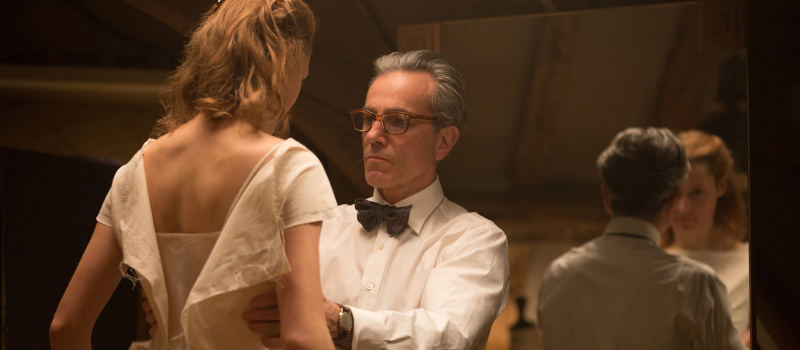 (4.5 / 5)
(4.5 / 5)
Paul Thomas Anderson’s latest is a meticulous study in mastery and the submission.
In what will proclaimedly be his final performance, Daniel Day Lewis stars as Reynolds Woodcock. A revered fashion designer in postwar London, his refined demeanour – his lithe form always impeccably attired; silver hair swept back gracefully from his forehead; that characterful crooked nose – conceals a bundle of neuroses and repression. Reynolds brings the same low-key, soft-spoken intensity to all aspects of his life, whether in instructing the seamstresses who work in his bright yet airless townhouse atelier or ordering a vast, Epicurean breakfast.
It’s during one such breakfast that he first encounters Alma (Vicky Krieps), an immigrant waitress whose self-conscious attempts at poise clearly chimes with Reynolds: she trips carrying a tray and smiles at him from across the café; he looks away, smiling gently to himself. She’s infatuated by his clear, unassuming command and so becomes his lover, his muse and disciple. She fulfils some unspoken need within him and he, in turn, presumptuously puts her to use; supposed flaws and all. On Alma’s supposed lack of breasts: “It’s my job to give you some… if I care to.”
Only Reynolds’ sister and housekeeper/gatekeeper, Cyril (Lesley Manville), seems to foresee trouble. The only one who seems attuned to his whims, it falls to her to handle his “affairs”. A self-proclaimed incurable bachelor, Reynolds holds his routines as sacrosanct. When they are disrupted, he can be brusque and cruel; such as in one devastating scene where Reynolds cuttingly wields his preferences like a social weapon. His utter self-command – the disdain with which, for instance, he sneers the word “chic” – may hide a weakness that Alma, in her desire to be loved, can use. After all, he’s only human; however seemingly self-controlled.
Sweeping and elegant, Phantom Thread‘s subtle power-plays brings to mind The Neon Demon – albeit with the focus on fashion, not flesh; an industry built around man’s refined sensibilities rather than woman’s beauty. However the blemish here runs counter to that in Nicholas Winding Refn’s earlier work: the lack of gore, of the layered muscularity that characterised The Master and There Will Be Blood. The pattern into which the film falls, though apparently loyal to the notion that inspired it, elegant and simple, if never quite bedazzling – an evening gown, not a wedding dress.
Anderson’s direction is Kubrickian in its sublimity, its poise and perfectionism, drawing a career-equalling performances Day Lewis. Krieps and Manville prove his equal; especially the latter whose witheringly matter-of-fact Cyril is more than a match for Reynolds. Jonny Greenwood’s score – an immaculate blend of the classical and ambient, the formal and the psychological; push and pull, give and take, command and submission – is the perfect tonal accompaniment. Particular mention must also go to Christopher Scarabosio’s sound design, which, more than anything, manages to place us inside Reynold’s head; a place in which the simple act of buttering a slice of toast proves an almost unbearable irritant.
In the end, though, like I you may wish that Phantom Thread had a few more secrets, perhaps; a little more hidden in the hems of its lining. Nevertheless, I look forward to unpicking it further on future viewings.
